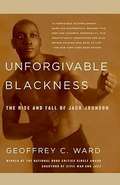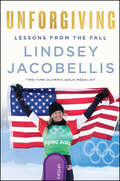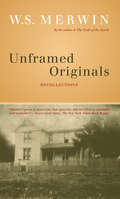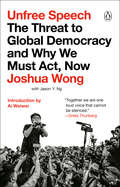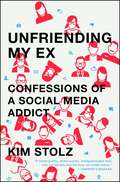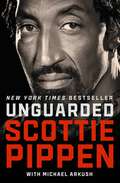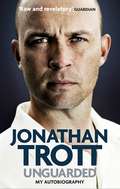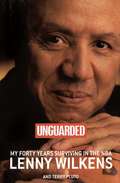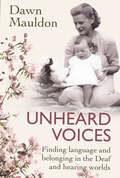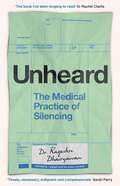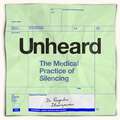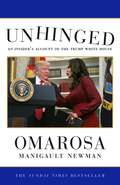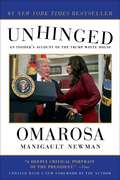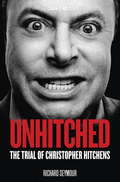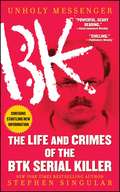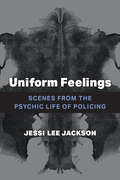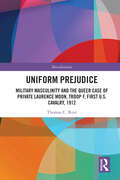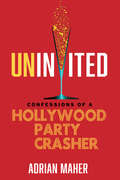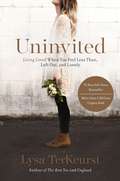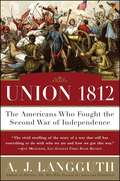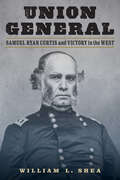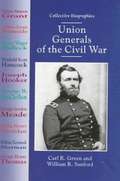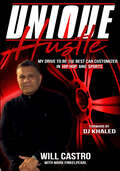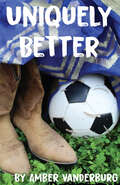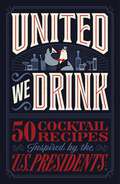- Table View
- List View
Unforgivable Blackness: The Rise and Fall of Jack Johnson
by Geoffrey C. WardIn this vivid biography Geoffrey C. Ward brings back to life the most celebrated — and the most reviled — African American of his age. Jack Johnson battled his way out of obscurity and poverty in the Jim Crow South to win the title of heavyweight champion of the world. At a time when whites ran everything in America, he took orders from no one and resolved to live as if color did not exist. While most blacks struggled simply to exist, he reveled in his riches and his fame, sleeping with whomever he pleased, to the consternation and anger of much of white America. Because he did so the federal government set out to destroy him, and he was forced to endure prison and seven years of exile. This definitive biography portrays Jack Johnson as he really was--a battler against the bigotry of his era and the embodiment of American individualism.
Unforgiving: Lessons from the Fall
by Lindsey JacobellisIn this deeply personal memoir in the vein of Andre Agassi's Open and Megan Rapinoe’s One Life, the winningest snowboardcross rider of all time chronicles her career, a story of self-growth that reveals the secret of her resilience and how she overcame crushing early failure to win Olympic gold.On February 16, 2006, twenty-year old American snowboarder Lindsey Jacobellis was poised to win the first gold medal in women’s snowboardcross, a sport making its Olympic debut. With a seemingly insurmountable lead over the other competitors, Lindsey only needed a clean run for the gold medal to be hers. But as the five-time world champion entered the last 100 meters the unthinkable happened: choosing to add a little flair to the run, she grabbed the back edge of her board—then lost her balance and fell. It was a mistake that would go down as one of the biggest “unforced errors” in all of sports history. For the next sixteen years, Jacobellis endured the criticism and second-guessing of Olympic commentators, sportswriters, and detractors. Day after day she persevered and trained harder on the snow and with her life coach, learning the power of resilience and what the sport really meant to her. The fierce competitor discovered that life, though it may not seem like it, does happen in just the right way: you end up precisely where you were meant to be. At the 2022 Beijing Winter Games, Lindsey twice reached the top of the podium, becoming a two-time Olympic gold medalist. Unforgiving recounts Lindsey’s journey from disappointment to triumph. It is an honest account of one life-altering misstep and its aftermath, and a reflection on what it means to come of age as an athlete in the spotlight, the weight of expectations, falling short, and ultimately fulfilling your dreams. Unforgiving is about the purpose-driven, forward-looking attitude Lindsey took on after her fall, when looking back wouldn’t have done anyone any favors. It’s about the pass she refused to grant herself until she’d earned it. Unforgiving is about the commitment to seek her own truth—and to speak up on one’s own behalf after letting others do it for years. Forgiveness, in the end, is at the heart of Lindsey’s story, but underneath and alongside is its polar opposite—an unending, uncompromising determination to push herself, to prove herself, to power past every obstacle in her path, even those of her own making.
Unframed Originals: Recollections
by W. S. MerwinIn this haunting, elegantly written memoir, W. S. Merwin recalls in utterly unsentimental prose his youth, growing up in a repressed Presbyterian household in the small river towns of New Jersey and Pennsylvania. The complex portrait that emerges of a family without language or history, transforms the story of their isolated lives into the development of a writer's conscience and a warning about the fate of a middle class eager to obliterate origins."This book is superbly written, offering deep glimpses into the complexities and mysteries of family bonds, with just that distancing from people and events necessary for artistic control."—Edmund Fuller, Wall Street Journal
Unfree Speech: The Threat to Global Democracy and Why We Must Act, Now
by Joshua WongAn urgent manifesto for global democracy from Joshua Wong, the 23-year-old phenomenon leading Hong Kong's protests - and Nobel Peace Prize nominee - with an introduction by Ai WeiweiWith global democracy under threat, we must act together to defend out rights: now.When he was 14, Joshua Wong made history. While the adults stayed silent, Joshua staged the first-ever student protest in Hong Kong to oppose National Education -- and won.Since then, Joshua has led the Umbrella Movement, founded a political party, and rallied the international community around the anti-extradition bill protests, which have seen 2 million people -- more than a quarter of the population -- take to Hong Kong's streets. His actions have sparked worldwide attention, earned him a Nobel Peace Prize nomination, and landed him in jail twice.Composed in three parts, Unfree Speech chronicles Joshua's path to activism, collects the letters he wrote as a political prisoner under the Chinese state, and closes with a powerful and urgent call for all of us globally to defend our democratic values.When we stay silent, no one is safe. When we free our speech, our voice becomes one.
Unfriending My Ex
by Kim StolzAn incisive, hilarious, and brutally honest memoir about life online and about how our obsessive connectivity is making us more disconnected--from former reality show contestant, MTV VJ, restauranteur, and go-to voice for millenials.Social media and technology have fundamentally altered the way we do business, couple and break up, develop friendships, and construct our identities and our notions of aspiration and fame. We make decisions about where we'll go based on whether it's Instagrammable. We don't have friends, we have followers. For an entire generation, an experience not captured on social media might as well not have happened at all. As someone whose identity has been forged by reality TV (as a contestant on America's Next Top Model) and social media and mobile technology, Kim Stolz is deeply obsessed with the subject. She has a hard time putting her phone down. And yet she remembers what life was like before technology-induced ADD, before life had become a string of late-night texts, Snapchats, endless selfies, that sinking feeling you get when you realize you've hit reply all by mistake. It's hard to imagine now, but there was once a time before we wasted a full hour emptily clicking through a semi-stranger's vacation pictures on Facebook, a time before every ex, every meaningless fling was a mere click away. Unfriending My Ex (And Other Things I'll Never Do) is the first book to document the hilarity of the social media revolution from the inside; it chronicles a life filtered through our obsessive relationship with technology. The book is as eye-opening as it is entertaining as it proceeds through the various ways in which social media and mobile technology have generated empathy deficits and left us all with the attention spans of fruit flies...and the sad fact that in spite all of this, we find it impossible to switch our devices off. Smart, hilarious, and completely relatable, Unfriending My Ex (And Other Things I'll Never Do) captures our crazy moment, shining a bright light on the trials and tribulations of life online.
Unguarded
by Scottie PippenAn unflinching memoir from the six-time NBA Champion, two-time Olympic gold medalist, and Hall of Famer—revealing how Scottie Pippen, the youngest of twelve, overcame two family tragedies and universal disregard by college scouts to become an essential component of the greatest basketball dynasty of the last fifty years. Scottie Pippen has been called one of the greatest NBA players for good reason. Simply put, without Pippen, there are no championship banners—let alone six—hanging from the United Center rafters. <P><P>There’s no Last Dance documentary. There’s no “Michael Jordan” as we know him. The 1990s Chicago Bulls teams would not exist as we know them. So how did the youngest of twelve go from growing up poor in the small town of Hamburg, Arkansas, enduring two family tragedies along the way, to become a revered NBA legend? How did the scrawny teen, overlooked by every major collegiate basketball program, go on to become the fifth overall pick in the 1987 NBA Draft? And, perhaps most compelling, how did Pippen set aside his ego (and his own limitless professional ceiling) in order for the Bulls to become the most dominant basketball dynasty of the last half century? <P><P> In Unguarded, the six-time champion and two-time Olympic gold medalist finally opens up to offer pointed and transparent takes on Michael Jordan, Phil Jackson, and Dennis Rodman, among others. Pippen details how he cringed at being labeled Jordan’s sidekick, and discusses how he could have (and should have) received more respect from the Bulls’ management and the media. <P><P>Pippen reveals never-before-told stories about some of the most famous games in league history, including the 1994 playoff game against the New York Knicks when he took himself out with 1.8 seconds to go. He discusses what it was like dealing with Jordan on a day-to-day basis, while serving as the facilitator for the offense and the anchor for the defense. On the 30th anniversary of the Bulls&’ first championship, Pippen is finally giving millions of adoring basketball fans what they crave; a raw, unvarnished look into his life, and role within one of the greatest, most popular teams of all time. <P><P><B>A New York Times Best Seller</b>
Unguarded: My Autobiography
by Jonathan TrottShortlisted for the 2017 Cross Sports Autobiography of the Year 'Full of illuminating anecdotes, piercing insights and unsparing self-analysis from the former England batsman' The Cricketer Jonathan Trott was England's rock during one of the most successful periods in the team's history - he scored a century on debut to clinch the Ashes in 2009, and cemented his position as their pivotal batsman up to and beyond the team's ascendancy to the number 1 ranked test team in 2011. Yet shortly after reaching those heights, he started to crumble, and famously left the 2012-13 Ashes tour of Australia suffering from a stress related illness. His story is the story of Team England - it encompasses the life-cycle of a team that started out united by ambition, went on to achieve some of the greatest days in the team's history but then, bodies and minds broken, fell apart amid acrimony.Having seen all of this from the inside, Jonathan's autobiography takes readers to the heart of the England dressing room, and to the heart of what it is to be a professional sportsman. Not only does it provide a unique perspective on a remarkably successful period in English cricket and its subsequent reversal, it also offers a fascinating insight into the rewards and risks faced as a sportsman carrying the hope and expectation of a team and a nation. And it's a salutary tale of the dangers pressure can bring in any walk of life, and the perils of piling unrealistic expecations on yourself.
Unguarded: My Forty Years Surviving in the NBA
by Lenny Wilkens Terry PlutoFor forty years, he has been the Quiet Man of the NBA. As a rookie, he was overshadowed by two pretty fair guards who entered the league at the same time: Jerry West and Oscar Robertson. As a veteran, he was -- both figuratively and literally -- a coach on the floor, but he had the misfortune to play for several struggling teams. As a general manager, he won a championship and made back-to-back Finals appearances -- but he did it without superstars, a year before Magic Johnson and Larry Bird revitalized the league. And as a coach, he has won more games than anyone in NBA history -- but spent his best years locked in the same division as Michael Jordan's Chicago Bulls. Basketball connoisseurs have long appreciated the style and intelligence with which Lenny Wilkens played and the unflappability and class he's brought to coaching. The respect he has earned resulted in his joining the legendary John Wooden as the only men to be inducted into the Basketball Hall of Fame twice -- first as a player, and then as a coach. Now, in Unguarded, Lenny Wilkens steps out from behind his placid demeanor to speak plainly and unequivocally on the enormous social and athletic changes he's seen in his career. Wilkens sounds off about the challenges he had to overcome in the course of his journey: the racism that left him off the 1960 Olympic basketball team and kept him from being chosen as head coach of the first Dream Team; the fatal miscalculation that kept his Cleveland Cavaliers from getting past Michael Jordan to the NBA Finals; the painful, frustrating task of coaching a troubled and troublesome J.R. Rider, a player who contributed to his departure from Atlanta. And he credits those who went out of their way to help him: the priests and nuns who taught him the value of discipline and reinforced his faith; the coaches who pushed him to develop his talents to the fullest; the selfless players such as John Johnson, Hot Rod Williams, Larry Nance, Steve Smith, and many others who sacrificed individual glory for the good of their teams; his mother, Henrietta, and his wife, Marilyn, who stood beside him in many trying times. Unguarded reveals the Lenny Wilkens we have never seen before, the tough, strong, thoughtful, and analytical man who has spent a life in basketball making his teammates and players better than they knew they could be. Thought-provoking, candid, always honest, Wilkens shares all the secrets he's learned in his four decades surviving in the NBA storm.
Unheard Voices: Finding language and belonging in the Deaf and hearing worlds
by Dawn MauldonIn this poignant and powerful memoir, the author tells the story of their childhood growing up with Deaf parents. Through intimate and evocative prose, Dawn explores the challenges and joys of living in a world that is often hostile and unwelcoming to those who are different.From the isolation and challenges that come with being a child of Deaf parents, to the strength and resilience that comes with love and belonging, the author shares their unique and deeply personal perspective on what it means to see and communicate in a richly silent world.This book is a must-read for anyone interested in the Deaf experience, and the power of love and belonging to overcome adversity. Beautifully written and deeply moving, Unheard Voices is an exploration of what it means to be a part of a diverse and vibrant culture.
Unheard: The Medical Practice of Silencing
by Dr Rageshri DhairyawanHave you ever felt unheard by your doctor? Been frustrated that they haven't understood your symptoms, that they have neglected your concerns?When Dr Rageshri Dhairyawan was admitted to hospital as a patient she didn't receive the pain medication that she told them she needed, despite her being a senior doctor. It was in that moment she understood that something was deeply wrong with our healthcare system. Doctors aren't listening, and it is making us ill.In Unheard, Dr Dhairyawan takes us on a journey through history to show how not listening to patients has been ingrained in medicine from its inception. Western medicine has been built on the assumption that power should always lie with the doctor, and that patients should be powerless to decisions made about their body if it is done to make them well. This, alongside the prejudices of society, has led to dramatic gaps in medical knowledge because for centuries people have not been heard.Dr Dhairyawan offers a way to reshape our health system for a future where active and engaged listening is the new frontier in a timely, shocking and engaging exposé of the medical world.
Unheard: The Medical Practice of Silencing
by Dr Rageshri DhairyawanHave you ever felt unheard by your doctor? Been frustrated that they haven't understood your symptoms, that they have neglected your concerns?When Dr Rageshri Dhairyawan was admitted to hospital as a patient she didn't receive the pain medication that she told them she needed, despite her being a senior doctor. It was in that moment she understood that something was deeply wrong with our healthcare system. Doctors aren't listening, and it is making us ill.In Unheard, Dr Dhairyawan takes us on a journey through history to show how not listening to patients has been ingrained in medicine from its inception. Western medicine has been built on the assumption that power should always lie with the doctor, and that patients should be powerless to decisions made about their body if it is done to make them well. This, alongside the prejudices of society, has led to dramatic gaps in medical knowledge because for centuries people have not been heard.Dr Dhairyawan offers a way to reshape our health system for a future where active and engaged listening is the new frontier in a timely, shocking and engaging exposé of the medical world.
Unhinged: An Insider's Account of the Trump White House
by Omarosa Manigault NewmanThe former Assistant to the President and Director of Communications for the Office of Public Liaison in the Trump White House provides a jaw-dropping look into the corruption and controversy of the current administration. Few have been a member of Donald Trump’s inner orbit longer than Omarosa Manigault Newman. Their relationship has spanned fifteen years—through four television shows, a presidential campaign, and a year by his side in the most chaotic, outrageous White House in history. But that relationship has come to a decisive and definitive end, and Omarosa is finally ready to share her side of the story in this explosive, jaw-dropping account. A stunning tell-all and takedown from a strong, intelligent woman who took every name and number, Unhinged is a must-read for any concerned citizen.
Unhinged: An Insider's Account of the Trump White House
by Omarosa Manigault NewmanThe former Assistant to the President and Director of Communications for the Office of Public Liaison in the Trump White House provides an eye-opening look into the corruption and controversy of the current administration. <P><P>Few have been a member of Donald Trump’s inner orbit longer than Omarosa Manigault Newman. Their relationship has spanned fifteen years—through four television shows, a presidential campaign, and a year by his side in the most chaotic, outrageous White House in history. <P><P>But that relationship has come to a decisive and definitive end, and Omarosa is finally ready to share her side of the story in this explosive, jaw-dropping account. A stunning tell-all and takedown from a strong, intelligent woman who took every name and number, Unhinged is a must-read for any concerned citizen. <P><b>A New York Times Bestseller</b>
Unhitched
by Richard SeymourAmong the forgettable ranks of ex-Leftists, Christopher Hitchens stands out as someone determined to stand out. Rejecting the well-worn paths of hard-right evangelism and capitalist "realism," he identified with nothing outside his own idiosyncrasies. A habitual mugwump who occasionally masqueraded as a "Marxist," the role he adopted late in his career, as afree radical within the US establishment, had ample precedents from his earlier incarnation. It wasn't the Damascene conversion he described. His long-standing admiration for America, his fascination with the Right as the truly "revolutionary" force, his closet Thatcherism, his theophobia and disdain for the actually existing Left had all been present in differentways throughout his political life. Post-9/11, they merely found a new articulation.For all that, the Hitchensian idiolect was a highly unique, marketable formula. He is a recognizable historical type--the apostate leftist--and as such presents a rewarding, entertaining and an enlightening case study.
Unholy Messenger: The Life and Crimes of the BTK Serial Killer
by Stephen SingularTo all appearances, Dennis Rader was a model citizen in the small town of Park City, Kansas, where he had lived with his family almost his entire life. He was a town compliance officer, a former Boy Scout leader, the president of his church congregation, and a seemingly ordinary father and husband. But Rader's average life belied the existence of his dark, sadistic other self: he was the BTK serial killer. The self-named BTK (for Bind, Torture, Kill) had terrorized Wichita for thirty-one years, not only with his brutal, sexually motivated crimes, but also through his taunting, elusive communications with the media and law enforcement. In 1974, BTK committed his first murders -- torturing and strangling four members of the Otero family -- and wrote the police an audacious letter declaring his responsibility for the Oteros' deaths and labeling himself, for the first time, BTK. Thus he established a pattern -- stalking and killing a series of ten victims, then bragging and claiming ownership of his crimes -- that ended in 1991 but left law enforcement confounded and the public with deeply troubling memories. Until, that is, he resurfaced in 2004 with another string of letters that would finally lead to his arrest. Drawing from extensive interviews with Rader's pastor, congregation, detectives, and psychologists who worked the case, and from his unnervingly de-tailed thirty-two-hour confession, bestselling author Stephen Singular delves into the disturbing life and crimes of BTK to explore fully -- for the first time -- the most dangerous and complex serial killer of our generation and the man who embodied, at once, astonishing extremes of normality and abnormality. In Unholy Messenger, Singular recounts the year prior to Rader's arrest, in which the BTK killer reemerged, and the aftermath. Woven throughout are the details of his crimes, elaborate schemes, and bids for public attention, and the wrenching impact his deception had on his family, church, and heartland community. The result is a chilling story of a man considered a "spiritual leader" by his pastor and congregation, who turned out to be the devil next door. More than just true crime, Unholy Messenger is a powerful, thoroughly engrossing examination of the intersection between good and evil, and of the psychology and spirituality of a killer in whom faith and bloodshed converged.
Uniform Feelings: Scenes from the Psychic Life of Policing
by Jessi Lee JacksonIn Uniform Feelings, American studies scholar and abolitionist psychotherapist Jessi Lee Jackson reads policing as a set of emotional and relational practices in order to shed light on the persistence of police violence. Jackson argues that psychological investments in U.S. police power emerge at various sites: her counseling room, manuals for addressing bias, museum displays, mortality statistics, and memorial walls honoring fallen officers. Drawing on queer, feminist, anticolonial, and Black engagements with psychoanalysis to think through U.S. policing—and bringing together a mix of clinical case studies, autotheory, and ethnographic research—the book moves from the individual to the institutional. Jackson begins with her work as a psychotherapist working across the spectrum of relationships to policing, and then turns to interrogate carceral psychology—the involvement of her profession in ongoing state violence. Jackson orbits around two key questions: how are our relationships shaped by proximity to state violence, and how can our social worlds be transformed to challenge state-sanctioned violence?
Uniform Prejudice: Military Masculinity and the Queer Case of Private Laurence Moon, Troop F, First U.S. Cavalry, 1912 (Microhistories)
by Thomas C. RustThis book examines the historical experiences of LGBTQ+ individuals facing discrimination in the early 20th-century military before same-sex acts were explicitly illegal. Centered on the court-martial of Private Laurence Edgar Moon in 1912, the book sheds light on the broader landscape of prejudice prior to the explicit criminalization of same-sex acts in 1916.Through Moon’s case, the narrative delves into the interplay of gender, sexuality, and power within the military and society. Army officers enforced a simplistic binary understanding of sexuality and masculinity, linking moral character to sexual behavior. Moon’s experience challenges this narrow view, revealing the complexities surrounding turn-of-the-century notions of masculinity and sexual identity. Employing a microhistorical approach grounded in queer theory, the book uncovers often-overlooked stories of queer service members who faced discrimination yet remained dedicated to their duty. It also highlights the evolving language and legal definitions related to same-sex acts and the cultural anxieties surrounding them, illustrating the importance of queer theory and microhistory in understanding marginalized experiences.Uniform Prejudice offers a compelling narrative of a century-long history of prejudice and persecution faced by LGBTQ+ individuals in the military. The engaging microhistorical approach captivates readers while addressing significant theoretical and historical themes. This accessible book is aimed at scholars, students, and general readers interested in LGBTQ+ history, military history, and the ongoing challenges and advancements of LGBTQ+ individuals in the U.S. military, urging a more inclusive and intersectional perspective.
Uninvited: Confessions of a Hollywood Party Crasher
by Adrian MaherDrawing on more than 20 years of interviews, anecdotes and personal experiences, Uninvited: Confessions of a Hollywood Party Crasher recounts the unique journey of a former Los Angeles Times reporter who, struggling with the collapse of his industry and personal tragedies, falls in with a group of intrepid gatecrashers who routinely pierce Tinseltown's celebrity party circuit. Author Adrian Maher is the first to chronicle this unique subterranean culture in La La Land—a group of social strivers, ambitious outliers, compulsive risk-takers and dysfunctional characters seeking access to a famous and exclusive society from which they've been banned. Uninvited uses all the author's skills as a veteran reporter, television producer, private investigator, archivist and humorous storyteller to reveal the unseen capers, snafus and mishaps behind Hollywood's palace gates against a backdrop of America's fascination with celebrity culture. And it exposes the personal struggles of an adrenaline-addicted gatecrasher facing perpetual moral challenges, physical dangers and psychological stressors that culminate in near disaster.
Uninvited: Living Loved When You Feel Less Than, Left Out, and Lonely
by Lysa TerkeurstThe enemy wants us to feel rejected . . . left out, lonely, and less than. When we allow him to speak lies through our rejection, he pickpockets our purpose. Cripples our courage. Dismantles our dreams. And blinds us to the beauty of Christ's powerful love. In Uninvited, Lysa shares her own deeply personal experiences with rejection--from the incredibly painful childhood abandonment by her father to the perceived judgment of the perfectly toned woman one elliptical over. With biblical depth, gut-honest vulnerability, and refreshing wit, Lysa helps readers: Release the desire to fall apart or control the actions of others by embracing God-honoring ways to process their hurt. Know exactly what to pray for the next ten days to steady their soul and restore their confidence. Overcome the two core fears that feed our insecurities by understanding the secret of belonging. Stop feeling left out and start believing that "set apart" does not mean "set aside." End the cycle of perceived rejection by refusing to turn a small incident into a full blown issue.
Union 1812
by A. J. LangguthBy the author of the acclaimed Patriots: The Men Who Started the American Revolution, a gripping narrative that tells the story of the second and final war of independence that secured the nation's independence from Europe and established its claim to the entire continent. The War of 1812 has been ignored or misunderstood. Union 1812 thrillingly illustrates why it must take its place as one of the defining moments in American history.
Union General: Samuel Ryan Curtis and Victory in the West
by William L. SheaUnion General is the first biography of Samuel Ryan Curtis, the most important and most successful general on either side in the Civil War west of the Mississippi River. Curtis was a West Point graduate, Mexican War veteran, and determined foe of secession who gave up his seat in Congress to fight for the Union. At Pea Ridge in 1862 and Westport in 1864, he marched hundreds of miles across hostile countryside, routed Confederate armies larger than his own, and reestablished Federal control over large swathes of rebel territory. In addition to his remarkable success as a largely independent field commander, Curtis was one of only a handful of abolitionist generals in the Union army. He dealt a heavy blow to slavery in the Trans-Mississippi and Mississippi Valley months before the Emancipation Proclamation went into effect. His enlightened racial policies and practices generated a storm of criticism and led to his temporary suspension in the middle of the conflict—but he was restored to active duty in time to win a crushing victory at Westport, where he saved Kansas and put an end to Price&’s Raid. Before the war Curtis was an accomplished civil engineer, a prime mover of the transcontinental railroad, and an important figure in the emerging Republican Party and was elected three times to the House of Representatives from Iowa. After the war he participated in pioneering efforts in peacemaking with the Plains Indians and helped oversee construction of the Union Pacific across Nebraska. This biography restores Curtis to his rightful place in American history and adds significantly to our understanding of the Civil War.
Union Generals of the Civil War (Collective Biographies)
by Carl R. Green William R. SanfordProfiles ten Union generals: Ambrose Burnside, Ulysses S. Grant, Henry Halleck, Winfield Scott Hancock, Joseph Hooker, George McClellan, George Meade, Philip Sheridan, William T. Sherman, and George Henry Thomas.
Unique Hustle: My Drive to be the Best Car Customizer in Hip Hop and Sports
by Will Castro Mark Finkelpearl&“This book is a must-read for anybody interested in bangin&’ custom cars, Hip Hop culture, and sports lifestyle.&” —LeBron James Will Castro, star of Velocity Channel&’s Unique Rides and one of the most popular car customizers in the country, has achieved the American Dream, finding great success doing something he loves. He has worked with many marquee names, and Unique Hustle is packed with anecdotes of some of the biggest names in sports, music, film and television; including P. Diddy, LeBron James, Nicki Minaj, Carmelo Anthony, Jason Derulo, Ice-T, and DJ Khaled, just to name a few. Discover Will&’s inspiring journey to success from growing up poor in the housing projects of New York&’s Lower East Side to customizing the rides of the rich and famous. Unique Hustle tells his personal stories of trial and triumph. With only a high school education, audacity, and passion, he ground out a place for himself in the world and hustled his way to the top. Alongside Will&’s story, Unique Hustle also provides a &“how to&” from a professional to readers who love to learn about cars and customization techniques. Readers will learn: Which cars are best suited for specific customizationsThe dos and don&’ts of car exteriors including paint jobs, rims, and wrapsThe dos and don&’ts of car interiorsHow to add &“unique&” flair with stereo and video systems, cigar boxes, and more
Uniquely Better
by Amber VanderburgIn 2016, Amber Vanderburg left her corporate job to become the only American, only female, and only blonde Academy football coach for the Paris Saint Germain Academy and Gameday Academy in Bangalore, India. As she emerged into the land of masala and chai, she found remarkably talented and driven players who were operating under a strict command-obey dynamic. Players would stand in a line, kick a ball, wait for direction. While this may be an effi cient way to teach a skill, in a game scenario, it was not effective. She witnessed players kick the ball during matches then turn to the sideline for future instruction. She noticed that the players had mastered tasks but didn't understand the game application. We see these parallels in our business life every day. People come to work, receive a task, and wait for instruction. Opportunities for ownership in teams establish opportunities to be uniquely better - Join Amber in her powerful story of team transformation; of daring adventures; of an exciting future in the beautiful land of India; of working within multicultural teams; of remarkable athletes coming together to build something great; of how teams can establish competitive advantage, and of a hometown Okie trying her best.
United We Drink: 50 Cocktail Recipes Inspired by the US Presidents
by Harper CelebrateDrink like a true American this election season with fun and creative presidential-themed cocktails! Whether you like a more conservative pour or are liberal with your libations, let's embrace the pursuit of happiness.It's election season, and if you're anything like most Americans, you like your ballots with a side of booze and your suffrage accompanied by something tall and stiff. In United We Drink, you're invited to celebrate the nation one presidential-themed cocktail at a time.Whether your political views come "with a twist" or are a little more "old-fashioned," this book has you covered. Inside this must-have bartender handbook you'll find:45 easy cocktail and mocktail recipes inspired by each of the presidents5 themed drinks for Republicans, Democrats, and Independents, with guided cutting lines so you can cut out whatever doesn't suit youInspirational, artfully designed quotes from Founding Fathers and former presidents Some of the all-American, presidentially-themed cocktails featured in United We Drink include:Cherry Nelson (inspired by George Washington)Massachusetts Mimosa (inspired by John Adams)Apple Rosemary Gin and Tonic (inspired by Abraham Lincoln)Irish Hot Chocolate (inspired by Chester A. Arthur)Hot Teddy (inspired by Theodore Roosevelt)Mezcal Margarita inspired by (Dwight D. Eisenhower)Frozen Strawberry Jackuiri (inspired by John F. Kennedy)Peaceful Peach Spritzer (inspired by Jimmy Carter) United We Drink is a must for:Election-night partiesPresidential debatesFourth of July get-togethersMemorial Day cookoutsAnd any night you're just feeling a little patriotic. With accessible ingredients and easy-to-follow directions, these recipes are made with the home bartender in mind. United We Drink is your party ticket to good times and fabulous drinks no matter which side of the aisle you sit on. So, raise your glass to America and enjoy something tall, refreshing, and cool this election season (or any season for that matter)!
